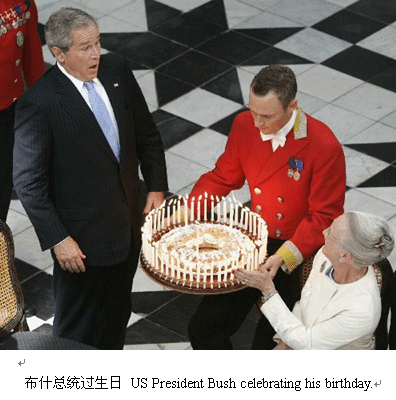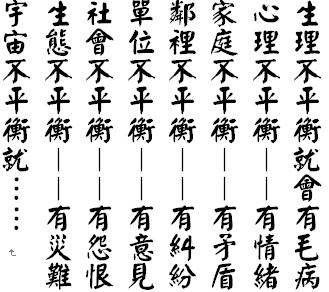大平衡认为:人,高等动物、情感机器。人生:人的生存过程。人性:人类本有和该有的品行。人生观:对人生的根本看法。人生观基本由世界观决定。大平衡认为:人生也是平衡的。
The Great Balance Theory regards human beings as higher animals and emotional machines. Human life is the living process of human beings. Human nature is the morality that human beings innately have and should have. Outlook on life is the basic view on life that depends, by and large, on world outlook. The Great Balance Theory also considers life to be balanced.
一、人体、生命是平衡的。无论什么人,有生必有死,有生、有死就是平衡。作为高等动物、情感机器的人体是平衡的。这是因为:
I. The human body and life are balanced.
The balance lies in the life and death that every human being experiences. As a higher animal and emotional machine, the human body is balanced for the following reasons:
1、人体本身就是一个比较完美、自给自足、自因自为的平衡体。如人的骨骼、肌肉、血管、神经、消化和出入进排系统。人从胚胎、新生儿、婴儿、儿童、青少年到人体发育成熟前,人体细胞是诞生多、死亡少;发育成熟后,细胞产生、死亡相当处于动态平衡。尔后则是死多生少……。
1. The human body itself, including the bones, muscles, blood vessels, nerves, and ingestion, digestion, and excretion systems, is a quite perfect, self-sufficient equilibrium entity causa sui and for itself. The number of born human cells exceeds that of the dead ones from the embryo stage, birth, infancy, childhood, to youth. When human beings reach maturity, the cells born and dead are in a dynamic balance. Thereafter, more human cells die than those born.
2、人体与外界进行 “能量、信息”交换,有效保障自体生存。中医的“经络系统”,应是人与自然进行“能量信息交换”——“微波接发”的重要通道,是大自然对人管理的“定位系统”。通过这个系统,人体可感受频率为0.5—28赫兹的电磁波,8—13赫兹间的电磁波是人体“乐意”接发的电磁波。
2. The energy and information exchange between the human body and the environment effectively guarantees the human body’s survival. The system of main and collateral channels in traditional Chinese medicine is an important passage for such exchange – microwave reception and transmission between human beings and the nature, as well as a positioning system for nature’s control over human beings. Through this system, the human body can feel electromagnetic waves of frequencies between 0.5 and 28 hertz. An electromagnetic wave of a frequency between 8 and 13 hertz is "enjoyable" for the human body to transmit and receive.
3、人体是“能量信息——肉身意识——物质精神有机统一的情感载体”。正是这一特点,使得中西医结合成为可能。也为自然科学、人文科学的有机结合提供了平台。
3. The human body is an emotional carrier, which organically unifies energy with information, body with consciousness, and matter with spirit. This characteristic makes the integration of Western medicine and traditional Chinese medicine possible, as well as providing a platform for the organic combination of natural science and humanities.
二、人性是平衡的。人性是“善恶”的有机统一。大平衡认为,人性是人“本有和该有”的生存本性。“善与恶”都是人的生存“必需”。就善、恶而言本身并没什么好坏之分。只有在人赋予它们情感色彩之后,才有了好坏取舍的主观意向。其实,只要不过分善、恶都是好的,都是人生存发展的手段。恶不过度也是善、善若过度亦是恶。如善、恶过度就都是坏的。善与恶相对,无善、无恶,无恶、无善。人性善、恶不仅永远同在,而且不断变化。不应将它们“固化”。俗话说,兔子急了还咬人呢。人要急了,什么事儿都有可能。
II. Human nature is balanced.
Human nature is the organic combination of good and evil. The Great Balance Theory regards human nature as the survival nature that human beings innately have and should have. Both good and evil are the necessities for the survival of human beings. The good and evil per se do not mean good or bad until human beings endue them with emotional colors . In fact, both good and evil are fine means of survival and development of human beings as long as they are not practiced unduly. Moderate evil is good while excessive good is evil. Undue good and evil are both bad. Good and evil are relative to and interdependent of each other. The good and evil in the human nature not only always coexist, but also keep changing, not fixed. Anything is possible for a person in desperation.
一般人的“善”在后天丢失较多,所以要修炼使其增加、回归保障生存。但也有特殊情况,如有人“太善、太软”,因此,为保生存他们反而应该增加一点“恶”。
Generally speaking, people lose much good after birth. Therefore, we need cultivation to gain and recover the original good to guarantee our survival. There are some people too good and soft. They should increase a bit evil to ensure their survival.
善,即“生”,分三个境界:
1、“求生”——无论如何先求“生”;先讲目的、后讲方法。
2、“善生”——既讲目的、又讲方法;君子爱财、当取正道。欲取先予。
3、“大生”——万物平等、和谐共生、其乐融融。
Good, i.e., "life", falls into three stages:
1、Seeking life – Trying to survive first on any account. Aim first, method second.
2、Good life – Laying equal emphasis on aim and method. Men of noble character seek wealth in
a decent way. Give before you take.
3、Perfect life – Equality of everything on earth, harmonious coexistence, and happiness for all.
一个人是这样,一个家是这样,一个企业、单位也是这样,一个国家、地区甚至整个人类都在这“生存三步曲”中随机选择、以保生存。
Every person, family, enterprise, institution, nation, and region, even the entire mankind makes choices according to the situation within this “life trilogy” for survival.
“求生”必逢“义利关”。义乃大利,利乃小义。有如忠、孝——忠乃大孝,孝乃小忠;政治是大经济,经济是小政治。清晰认识、摆正位置,行动就会简洁、高效:当善则善、当恶则恶,相机而行。
People seeking life will surely face the choice between righteousness and profit. Righteousness is great interest while profit means small righteousness as much as loyalty equals great filial piety and filial piety small royalty. Politics is big economy and economy small politics. Clear understanding and appropriate positioning foster neat, efficient action; be good or evil, according to the situation.
过去,人的性“善”、性“恶”之辩都是各家之言。但“善”“恶”是相对的,失去一方另一方亦将不在。“善恶”皆有才能生存。否则就是绝对不能存在。因此,大平衡认为人性应当是“善恶兼有善居多”。当然,这只是一家之言不是定论,大家可以继续探讨。
Opinions on human nature, good or evil, differed from person to person in the past. Good and evil are relative. If one disappears, the other no longer exists. Only when good and evil coexist, human being is able to survive. The Great Balance Theory holds that human nature should have both good and evil and generally good dominates. Of course, this is just a preliminary view for further discussion rather than a final conclusion.
三、人的权利与责任是平衡的。人从父母得知有了她(他)的那一刻起,他就担当起了“爱的结晶”、“生的希望”的角色。后来又在家庭、学校、社会中扮演着各种不同的角色,但无论是那一种角色都是“权利与责任” 的对等、平衡。虽然实践中有不对等、不平衡的情况,但只是过程不是结果。
III. People’s rights and obligations are balanced.
Since the moment when a person’s parents get to know his/her existence, he/she has been considered the crystallization of love or the hope of life. Later, the person plays various roles in the family, school, and society. Every role is a balance between rights and obligations. Certain exceptions in reality only appear in the process, and are not the final results.
总之,人性是善、恶的“有机统一”,人性在后天是变化的。人生是一个过程,人的生存一刻也离不开他人、他事、他物。无论动物、植物、微生物还是其它什么大家都一样,都是大自然的产物、都是兄弟姐妹。大家应当平等相待。人生的意义在于既要享受生活、又要完成使命。
In brief, human nature is the unity of good and evil and keeps changing after birth. Life is a process. A person cannot live for a moment without the other people and things. As products of nature, all animals, plants, microorganisms, and so on are brothers and sisters with no difference and should treat each other equally. The meaning of life lies in the unity of enjoying life and completing tasks.
多学人长、少讲人短。少夸己长、多补己短。——马 洪
More learning from others’ strong points, less criticism on others’ shortcomings. Less bragging about one’s own strong points, more making up for one’s own shortcomings.
—— Ma Hong, a famous scholar of the Chinese Academy of Social Sciences
“常修为政之德,常思贪欲之害,常怀律己之心” ——胡锦涛
Constantly cultivate the morality in governance, keep the harm of greed in mind, and conduct self-discipline. —— Hu Jintao
中篇小结:本篇顺接上篇平衡理念,从宇宙、生态、社会、人生的现实中具体考察平衡现象、平衡规律的存在情况。结论是:
“平衡”普遍地存在于天地人间。没有平衡就没有世界。
A brief summary for Part II:
This part carries on the concept of balance in Part I, and makes an examination of the concrete existence of the phenomena and laws of balance in reality, based on reality of the universe, ecosystem, society, and life. The conclusion is:
Balance exists universally in the world, which cannot survive without balance.


|

